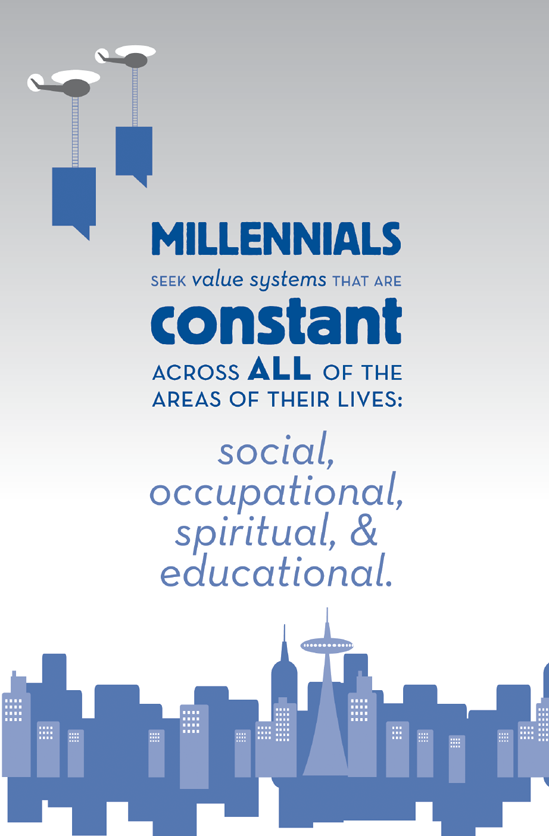7.1. CONNECTING WITH MILLENNIALS
Everyone is trying to reach these so-called slacker elites, and everyone is consistently failing to do so. The result has been an exasperated profusion of op-ed dismay over a work force that has hardly passed the fetal stage. The Millennial classification includes individuals between the ages of 13 and 30, approximately. That means that although this generation has, at best, less than 10 years of active work experience, we have already branded them unfit for duty.
Meanwhile, the businesses, movements, and politicians that are embracing these youngsters are thriving. Millennials tend to be extremely loyal to brands, motivated by morals and ethics over dollars and cents (think Whole Foods versus Walmart), and technologically savvy. Facebook, Twitter, and blogosphere campaigns disseminate staggeringly in-depth ideals and information to large cohorts of this generation in minutes or even seconds. If you push a Millennial's button, they'll post it, tweet it, and blog about it. That goes for the good and the bad.
Push a Boomer's button, by comparison, and they'll tell a neighbor—maybe two. Sure, there are some technologically savvy members of this generation as well, but the compounded power of word of mouth is decidedly concentrated among Millennials. Therefore, your goal is to get this group actively involved on your behalf. It's foolish to write them off as over-privileged since these people will work for you free of charge in the realm of social media. It's sort of ridiculous, like hiring squirrels to crack nuts for you and having them like it.
Consider the changes in technology that have occurred over the past 13–30 years: Where was the Internet three decades ago? What could it do? How difficult/expensive was an international phone call? If you wanted to find a recipe for piecrust, where did you go? If you needed to write a report on tigers, where could you look? If you missed your favorite show one night, what were your options?
The forbearers of the Millennial generation precipitated all of these changes; now that they embody the full measure of these advancements, many individuals resent them. We have to understand that Millennials don't view absolute technological saturation as anything other than a fact of life, like grass or air. They are accustomed to having everything they need right at their fingertips. They learned to read with wireless connectivity-enabled Leap Frog pens that scanned and read the words they didn't understand. They're accordingly confident in their ability to figure things out. Sometimes this can come across as entitlement; other times, they seem more resourceful than any other generation. A new Millennial in the office is far more likely to answer his own questions online than an older worker. They detest the obvious and the redundant. They expect to use the full range of technological capabilities in everything they do: work, play, and apparently even sleep (judging from the iPhone's sleep noise app).
Members of this generation have witnessed a shocking amount of corporate irresponsibility, from Enron to the recent financial meltdown, and a good deal of social change, too. Movies like Food, Inc. and Fast Food Nation have been extremely successful among Millennials, who have no problem paying $5/lb for ground beef when $2/lb is available. They're not necessarily wealthy or financially privileged, but they do have a tendency to value ideals and principles over raw (no pun intended) financial concerns.
Reaching Millennials isn't rocket science; however, it does require some pronounced perspective taking if you are in your mid-30s or older. For brevity's sake, we'll assume that the 12 and under crowd isn't presenting just yet. The following are some of the common roadblocks to reaching this new generation.
7.1.1. The Prince
In his renowned work, Machiavelli stated that a prince would display more grace in losing a father than an inheritance. Managers all across the country are wrestling with a similar perception of the Millennials in the workforce today. The complaint I hear most often is that these young professionals don't work as hard, arrive with a sense of entitlement every day, and don't respect authority.
In reality, the situation is far more nuanced. Statistically speaking, Millennials were raised in two-income families and grew up doing more things for themselves. They may not know much about business, but their bent is self-sufficiency. They'll Google what they don't know; asking the Boss is a last resort. Though it may sound counterintuitive, activating Millennials requires placing far more responsibilities on their shoulders. Overwhelm them with directives, not rules. Give them clear and incredibly lofty objectives, and encourage them to simply get the job done. They'll want to work from home (using the technology they're so familiar with), so try it out: clearly establish what needs to be done, and hold them accountable to their results. You may be surprised at how much they're willing to work given this sort of freedom.
Use some of these same guidelines in the presentation setting. If you have activities or discussions you want to foster, don't waste their time in a stuffy auditorium. Instead, try sending them home to continue the discussion online. Generate passion and enthusiasm for the ideals you're discussing; don't overload them with easy-access information. If you sell them a value, they'll join the relevant Facebook group and stay up till 1 a.m. reading about it online.
Most importantly, make certain that any presentation you deliver to a group of Millennials has an extremely clear objective: lay the standard and hold them accountable to the necessary action. If you're selling a product or service, focus on the underlying values that differentiate your product from a competitor's—especially if that competitor is a larger corporation. And if you're the corporation, be sure to play up stories pertaining to your company's beginnings, when it was just another Mom & Pop store somewhere in Middle America. Remember, their world is connected and everything is local. You should be, too.
7.1.2. No Waiting
Millennials spent half of their educational careers watching adults fumble through Windows operating systems, trying to demonstrate exciting new technology. From a young age, they were more proficient than their instructors, in much the same way that a two-year-old learning English and Spanish has an easier time than the high school or college student taking Spanish 101. Their brains are wired for immediate access in a way that many of us cannot even fathom. The good news is that we don't have to catch up; we just have to incorporate these notions into that with our presentations.
Millennials are not likely to value the buildup; they've seen every movie, heard every song, read every story, and so on. They have been suffused with culture for the duration of their lives, so don't walk into the presentation expecting to blow their minds. Instead, challenge them on values. Millennials seek values systems that are consistent across all of the areas of their lives: social, occupational, spiritual, and educational.
In my personal experience, I have found that Millennials are far more receptive to overt challenges than other generations, but far less tolerant of an elaborate story.
The lesson, then, is to approach the presentation with intensity and focus. Put them in the back seat, buckle them in, and get the car going 50 mph or faster—high-speed enough to discourage bailing. Keep the foot on the gas, too. You may finish your presentation early, but who cares? They're trying to figure out why you're not web conferencing with them from home in the first place.

7.1.3. Great Expectations
With an idealist generation comes a lofty checklist for presenters. Millennials trend metaphysical: They experience the greatest amount of friction with their managers over issues of purpose, destiny, and dreams. They're not going to understand why they shouldn't have the opportunity to be deeply and morally engaged with what they do at a very early point in their careers. Remember, for them, the world has been "flat" for decades. Moving across the Atlantic for a job is not too different from moving across the state, and they're inclined to seek one-of-a-kind experiences over the ordinary or the secure.
We can either beat our heads against the wall in frustration as we bicker over whether or not a 26-year-old has the right to enjoy working from home instead of from an office, or we can accept that this is a changing reality in today's work culture and take advantage of it. What better a time to raise the bar for productivity and quality than at the exact moment that you bestow upon your Millennials their coveted autonomy? You can test me on this: The next time you have to communicate with a group of Millennials, try bartering freedom for great expectations. The one thing you do not want to do is approach them in an authoritarian manner, focusing on minutia and ignoring the big picture. It may be how you were raised to think, but it's far easier to change our own approach than it is to change a generation. We have to gain influence before we can impart values.
7.1.4. Plugging In
If you're not too technologically savvy yourself, you should seriously consider involving a Millennial during your brainstorming session. Specifically, engage him or her in discovering new ways of making your presentation content interactive. What are the possibilities on Facebook? Twitter? Blogs? Can you demonstrate certain claims by having a member of the audience use their iPhone to prove information on the spot? Because an audience composed of teens to 20-somethings is going to start twitching for their Woobies about 10 minutes after you take the stage, I advise all to put offense aside and get them tapping with you instead of at you. Imagine the sort of reach and publicity you can get just by asking them to share your key message through their preferred social media outlet. They'll be so relieved to have their electronics back out where they can see them that they'll likely generate thousands of free impressions of your company to everyone they know.
The faster we start thinking about Millennials' strengths rather than their weaknesses, the faster we can tap into the power of this up-and-coming generation for the benefit of our messages.
